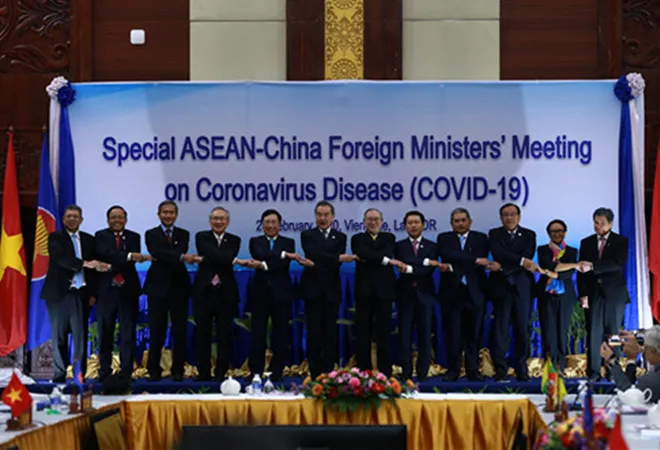
The COVID19 outbreak that began in Wuhan in December 2019 will not leave Southeast Asia unscathed. As of April 7, some 15,000 COVID-19 cases have been identified in the region, according to official measures. Many believe that underestimates the true spread of the virus.
Even before case counts began to climb, China’s virtual economic standstill was already quick to take its toll, disrupting trade, travel, and supply chains throughout the region. For example, Singapore’s economy contracted by 2.2 percent in the first quarter of 2020 from a year ago, while Malaysia’s economy is expected to contract by as much as 2.9 percent in 2020, with some 2.4 million job losses. Although some countries may be more severely impacted than others, depending on the depth of their links with China and on the weight of the tourism industry in their GDP, the impact was violent and is likely to be even more devastating as the pandemic spreads further.
Interestingly, this crisis also revealed a new diplomatic and political proximity – heading toward an alignment with or at least, a de facto acceptance of China’s practices and standards. One question rings an alarm bell: Why, despite evidence of the contagion potential of a virus that first hit neighboring China, didn’t the countries of Southeast Asia better protect themselves?
The way certain Southeast Asian countries responded to the crisis is particularly telling, as it might reveal the extent to which they have internalized Beijing’s logic and rhetoric. In other words, as most Southeast Asian governments anticipate China’s potential reaction and adjust their behaviors accordingly, China no longer needs to exert explicit pressure. The COVID-19 crisis has made this trend more obvious, highlighting not only the internalization of this “privileged relationship” but also a more disturbing – but unspoken – reality: Southeast Asian countries’ acceptance of China’s soft power and their dependence on it. This change of tone is indeed good news for China’s proactive diplomacy.
Questioning Southeast Asia’s Reactions to COVID-19
Whether Chinese authorities underestimated or downplayed the severity of the virus and its lethal spread remains an open question. Be that as it may, another question remains on the table: Why, despite warning signals, were the regional states so slow to acknowledge the source of the threat and act accordingly? All the first reported cases of infection, in Thailand (January 13), Singapore (January 23), Vietnam (January 23) or Malaysia (January 25) were people from or having made a recent stop-over in Wuhan. Considering the porous borders and transport connectivity in this part of Asia, why was there no discussion nor formal decision to act and cut the transmission lines of the virus before the largescale arrivals due for the Lunar New Year? Flights from Wuhan were maintained (until early February in Indonesia, for instance). Everywhere in the region, from Davao to Mandalay through Surakarta, celebrations, night markets, and Lion or Dragon Dance performances for local communities as well as tourists were confirmed to celebrate the Year of the Metal Rat. Hotels were ready to welcome the thousands of Chinese tourists that typically visit Southeast Asia during this special time of the year. It was business as usual despite the flow of alarming news coming from Hubei province about an exponential rise of daily cases. Why did nobody publicly question the repercussions of this health crisis on their domestic safety?
Was it because no one had any interest in spoiling the fun and undermining the consumption surge usually associated with the celebrations? Very probably: The substantial revenues from tourists took precedence over other objectives. But some complementary explanations might be suggested, enlightening the very implicit, yet sophisticated, way Chinese leaders exert authority on a region they consider as their backyard through protocols, diplomatic messaging, and vocabulary lauding Chinese prestige and its ability to fight, as well as through measures to control badmouthing and resentment over China on social media.
Southeast Asia and Chinese Rules
The first rule is not to displease or bother China, notably when it is facing a critical period (in this case, during its efforts in tackling the virus). No one summarized this mindset better than an effusive Hun Sen when the Cambodian prime minister declared during his highly symbolic visit to Beijing on February 2 that “a friend in need is a friend indeed.” And even if no one else expressed support to the Chinese leadership so bluntly, most Southeast Asian leaders complimented President Xi Jingping’s ability to deal with the adversity in highly reverential and laudable terms. While receiving Xi in Naypyidaw on January 18, Aung San Suu Kyi deliberately ignored the topic of the new virus so as not to put her guest in a delicate position and cast a shadow over the meeting. Some days later, however, Myanmar President U Win Myint sent a message of support to Xi Jinping, praising the merits of “Xi’s able leadership and those of China’s advanced medical technology.” In a phone conversation with China’s president on February 13, then-Malaysian Prime Minister Mahathir Mohamad congratulated Xi for his “great efforts.” Singaporean President Halimah Yaacob commended Xi’s “decisive measures” while Prime Minister Lee Hsien Loong applauded “China’s firm and decisive response.”
For sure, China’s leadership did a great job in confronting the virus from late January on, but to focus only on those efforts exempts the Chinese leadership of responsibility for its initially botched answer, silences debate over questionable measures, and may also have contributed to a false sense of security in Southeast Asia, delaying rational decisions for dealing with the severity of the virus’ spread. Despite alarms, it was not before Wuhan’s lockdown (and even six days after) that Southeast Asian States imposed first travel restrictions from Hubei, to be further extended to the rest of China. Only Vietnam and Singapore, remembering the traumatic experience that occurred with the SARS outbreak of 2002-03, opted for decisive action, blocking entry not only for passengers coming from Wuhan but for all visitors who had been to China in the last 14 days. Furthermore, Singapore began to implement tracking of 2 000 people with a history of travel to Hubei.
The second rule is a fear of retaliation. “China will recognize its friends” could summarize the mindset of Chinese diplomacy. Those who offered “friendly understanding, support, and help” to China during the crisis will probably be granted special advantages, for instance. What appears clearly from official declarations is that most countries within Southeast Asia have been asked to consider the “negative impact” on investment and the economy before taking such measures as a travel ban. Chinese ambassador to Indonesia Xiao Qian declared “in this situation, we need to be calm. Don’t overreact and cause a negative impact on investment and the economy.”
Some evidence of a response to potential economic coercion was incidentally given by Southeast Asian officials. The most explicit demonstration was to be found in the Philippines during a debate at the Parliament. The health secretary, Francisco Duque, refused to deny Chinese tourists’ entry to the country because he thought “diplomatic relations with China might sour as a result and there will be serious political and diplomatic repercussions.” He further explained that “if we do this, then the concerned country – China in this case – might question why we’re not doing the same for all other countries that have reported cases of the new coronavirus. It’s very tricky.” Such concerns were undoubtedly shared by other governments.
This essay originally appeared here
The views expressed above belong to the author(s). ORF research and analyses now available on Telegram! Click here to access our curated content — blogs, longforms and interviews.




 PREV
PREV


